INSIDE ISSUE 18.50 | Dec. 13, 2019
 BIG STORY: S.C. lacks strategy for helping poor, critics say
BIG STORY: S.C. lacks strategy for helping poor, critics say
NEWS BRIEFS: S.C. Medicaid recipients face new work requirements
COMMENTARY, Brack: Get these five things right in 2020
SPOTLIGHT: The Felkel Group
MY TURN, Ott: Congress must fix surprise medical billing to help South Carolinians
FEEDBACK: Got a comment? Let us know.
MYSTERY PHOTO: What’s the story behind this house?
S.C. ENCYCLOPEDIA: White lightning
S.C. lacks strategy for helping poor, critics say
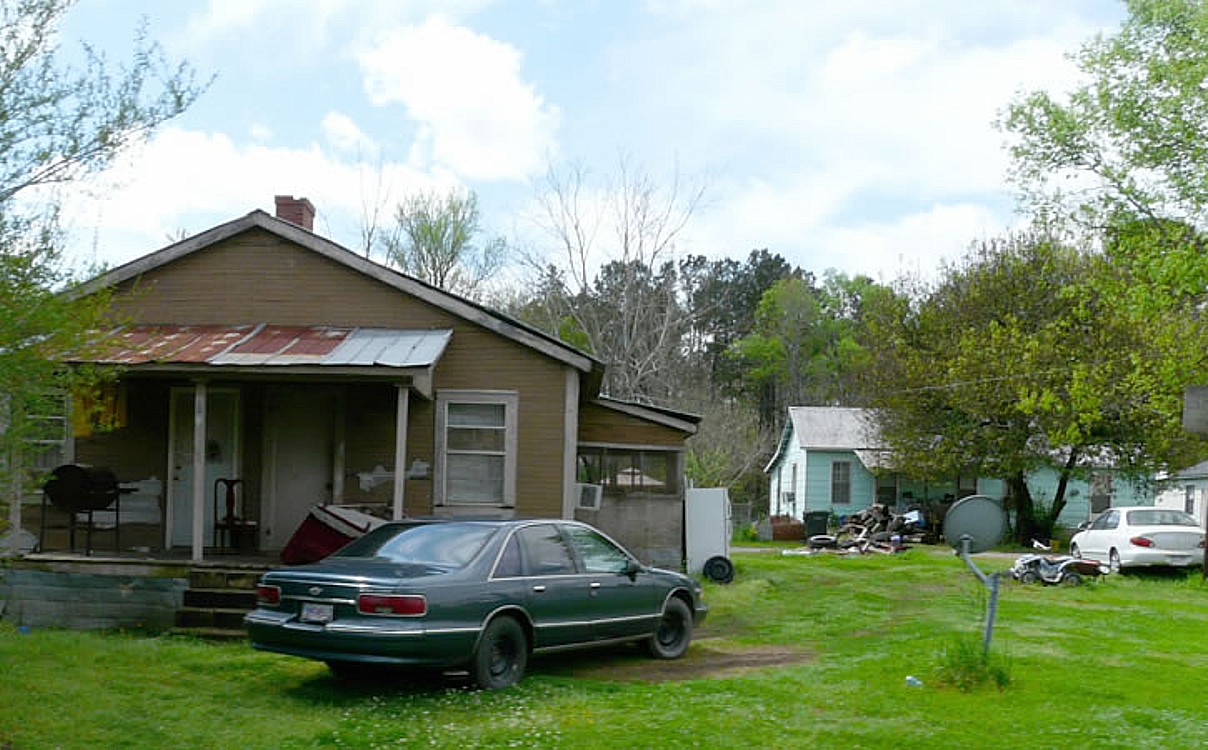
By Lindsay Street, Statehouse correspondent | Twenty-four dollars a day isn’t enough to allow the state’s poorest residents to access opportunities and escape the cycle of poverty, according to low-income nonprofit leaders.
According to new numbers from an index using U.S. Census numbers, the average daily income in South Carolina’s poorest households is $36, and at least $12 of that goes toward rent.
The Palmetto state is ranked 43rd nationally on poverty, according to the 2018 JustSouth Index recently published by Loyola University New Orleans Jesuit Social Research Institute. It reported:
- The average annual income for the state’s poorest households is $13,266.18,
- 26.3 percent of the state’s poorest people are without health insurance, and
- 61.9 percent of the state’s poorest people have housing costs exceeding 30 percent of their income.
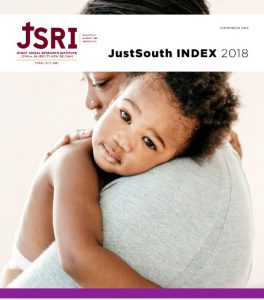 For those who work with low-income South Carolinians, the results of the index were not surprising.
For those who work with low-income South Carolinians, the results of the index were not surprising.
“We don’t have the strategy or plan for getting people out of poverty. In fact, just the opposite, we want to cut their benefits or cut their food stamps,” Palmetto Project Executive Director Steve Skardon said. “We are unwilling in South Carolina to bring about systemic change that would bring about a different result than we’re getting right now.”
The Loyola report primarily focused on Gulf coast states, but included a ranking for all 50 states and Washington, D.C.
“The lowest ranked states are, as a whole, heavily concentrated in the South. Looking just at the 11 former Confederate states, 10 of them are in the bottom 14 positions in our Index,” according to the report.
Among the poverty rankings, Minnesota was least impoverished, followed by Iowa. South Carolina was sandwiched by New Mexico at 42nd and Alabama at 44th. Texas and Mississippi were ranked 50th and 51st, respectively.
One in seven in S.C. live in poverty
According to the U.S. Census Bureau, 777,871 people in South Carolina, or about one in seven or 15.3 percent, live in poverty. Poverty is defined by the federal government as a one-person household earning less than $12,490 or a four-person household earning less than $25,750 (about $17 per person per day). Nationwide, 11.8 percent live in poverty. Only three counties in South Carolina are have less poverty than the national average: Beaufort, Greenville and York counties. By contrast, 37.3 percent in Allendale County live in poverty.
- Previous coverage: 130,000 children in the state are in poverty.
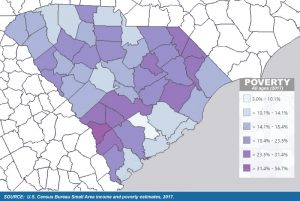 “(Poverty) impacts individuals in every aspect of their lives from health to hunger to ability to have upward mobility and improve their lives,” SC Appleseed Legal Justice Center Director Sue Berkowitz said. “If you have such a large percentage of people in your state living at or near poverty … you have people who can never get ahead and it then means that things like health metrics are incredibly low.”
“(Poverty) impacts individuals in every aspect of their lives from health to hunger to ability to have upward mobility and improve their lives,” SC Appleseed Legal Justice Center Director Sue Berkowitz said. “If you have such a large percentage of people in your state living at or near poverty … you have people who can never get ahead and it then means that things like health metrics are incredibly low.”
Berkowitz said the state’s historical racism plays a role in perpetuating poverty. For so long, “so many people in our state were unable to accumulate any wealth and assets and that adds to poverty,” she said.
Aditi Srivastav of the Children’s Trust of South Carolina said poverty becomes “a community systemic issue” that begins in childhood. Children in poor homes don’t have access to food, making it difficult for them to learn in schools. They also don’t have access to better schools, or good transportation that allow for better opportunities, she said. And all of those things — food insecurity, poor transportation, lack of work opportunities — contribute to poor health outcomes, she added.
- Read a United Nation’s report that found worldwide inequality isn’t just about access to jobs, but also access to education, technology, career advancement, and more.
What to do about it
The JustSouth Index offered these actions steps to reduce poverty:
- Increased wages. A full-time worker earning the federal minimum wage of $7.25 and working 50 weeks a year earns about $13,266.18 — the average income of the state’s poorest households. The report called boosting the state minimum wage law “a powerful tool” in combating poverty. Skardon said: “Most poor South Carolinians work. It’s just that the jobs they have are not sufficient.”
- Earned Income Tax Credits. State Earned Income Tax Credits, like the one now available in South Carolina, have been “highly effective” for helping families out of poverty, the report said.
- Expand Medicaid. South Carolina and many Southern states declined expansion of Medicaid under the 2008 Affordable Care Act. The report said expanding access to the program, which is limited to adults earning 67 percent of the poverty level. Had Medicaid been expanded, eligibility would have been expanded to those earning 138 percent of the poverty level. Read about how deaths have been attributed to states not expanding Medicaid.
- Outreach for health connections. The report said states should engage in outreach activities to encourage enrollment among rural and immigrant residents.
- Affordable housing incentives. The report said the state should offer incentives to developers and municipalities to encourage affordable housing development. It also suggested supplementing federal housing programs.

“A first step in breaking the cycle of poverty in South Carolina is rethinking our understanding of its root causes. Policymakers for the most part still think poverty is caused by lazy people who don’t want to work,” Skardon said. “This thinking is what fuels the persistence of poverty and exacerbates income inequality.”

Berkowitz agreed that paying a living wage and increasing health care coverage are key in combating poverty.
“We (shouldn’t) penalize people and treat them badly because they are living in poverty,” she said.
Srivastav said poverty affects everyone in the state.
“If we don’t address poverty everybody suffers,” she said. “Everybody has to kind of change their mindset and recognize that just because me and my family is flourishing doesn’t mean I don’t have a role to play in helping others to do the same.”
- Have a comment? Send to: feedback@statehousereport.com
S.C. Medicaid recipients face new work requirements
By Lindsay Street, Statehouse correspondent | Up to 25,000 people could lose their Medicaid benefits in South Carolina if they don’t find employment, training or volunteer opportunities.
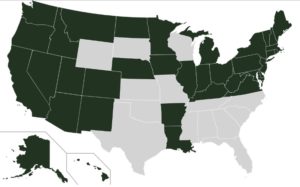
The Trump administration this week authorized South Carolina to become the first state that has not expanded Medicaid to require “community engagement” for beneficiaries. The plan, pushed by GOP Gov. Henry McMaster, has been in the works since January 2018.
According to the new requirements, selected beneficiaries would have to document 80 hours of employment or volunteering monthly, or be enrolled in an education or training program.
An analysis provided by the state’s Medicaid agency shows the new requirements would affect about 6,000 able-bodied adults currently receiving benefits — although the number could be as high as 25,000.
The S.C. Department of Health and Human Services estimated that of the 83,461 beneficiaries potentially affected, 60 percent are currently employed, 6 percent are engaged in qualifying educational or community service activity, and 4 percent would have a qualifying excuse not to work. That leaves 30 percent or about 25,000 people who would need to find work, volunteering or training to maintain their health insurance access.
Some of the national coverage the state has received as a result of Thursday’s announcement:
- S.C. decision signals Trump administration’s reshaping of largest public insurance program via The Washington Post.
- South Carolina becomes first state without expanded Medicaid to receive work waiver via The New York Times.
In other S.C. news:
![]() Fewer retirements mean fewer teachers left classrooms in S.C., study says. Nine percent fewer teachers left the classroom in 2018-2019 compared the previous year, according to a new report from the Center for Educator Recruitment, Retention, and Advancement. The report found that 6,650 full-time S.C. teachers left their positions during or at the end of the 2018-19 school year. The report also said the school year saw “significantly fewer” retirements, helping to explain the decrease in those leaving the classroom. Read the full report here.
Fewer retirements mean fewer teachers left classrooms in S.C., study says. Nine percent fewer teachers left the classroom in 2018-2019 compared the previous year, according to a new report from the Center for Educator Recruitment, Retention, and Advancement. The report found that 6,650 full-time S.C. teachers left their positions during or at the end of the 2018-19 school year. The report also said the school year saw “significantly fewer” retirements, helping to explain the decrease in those leaving the classroom. Read the full report here.
Senate, House prefile 162 bills. Members of the Senate and House pre-filed a total of 162 bills Wednesday on Dec. 11e. See the 91 pre-filed bills in the Senate here. See the 71 pre-filed bills in the House here. The second year of a two-year session begins Jan. 14.
Many of state’s uninsured could access ‘free’ plans. According to the Kaiser Family Foundation, 40 percent of the state’s uninsured population, or 166,000 people, could qualify for the federally-subsidized bronze plans that have $0 monthly premiums. The bronze plans have high deductibles — the average is $6,506 — but health experts say that is less than the cost of hospitalization without insurance. Read the report.
S.C. Historical Marker Program releases new digital guidebook. The digital S.C. Historical Markers guidebook for Winter 2019 was released this week. The guidebook includes a list of all markers approved by the S.C. Historical Marker Program, organized by county and order of approval. See the guidebook here.
Natural gas prices saved S.C. consumers $6.4B, group says. Fossil-fuel friendly nonprofit Consumer Energy Alliance is touting customer savings due to the low price of natural gas. In a new report, the nonprofit says South Carolinians saved $6.4 billion. Read the report.
States begin eyeing taxes to curb vaping. South Carolina isn’t the only state looking to curb use of electronic cigarettes among young adults. According to a recent report by Kaiser Health News, 20 states and the District of Columbia have passed legislation to tax vaping products. Read more about proposed regulations for South Carolina.
McMaster taps Upstate lawmaker to lead veterans agency. Gov. Henry McMaster named freshman Greenville Republican Rep. Bobby Cox as his choice to lead the state’s new Department of Veterans’ Affairs. The nomination is subject to confirmation by the Senate. Cox was elected in 2018, and previously served four tours in Iraq as an Army Ranger. He is a graduate of The Citadel. Read more.
2020 candidate calendar
 Throughout the campaign season, we are working to keep South Carolina informed of candidate events in the state. Have an event you want us to know about? Email us at 2020news@statehousereport.com.
Throughout the campaign season, we are working to keep South Carolina informed of candidate events in the state. Have an event you want us to know about? Email us at 2020news@statehousereport.com.
Gabbard swings through S.C. this weekend. Hawaii Rep. Tulsi Gabbard is in South Carolina through Dec. 15. Here are some of her stops:
- 1:15 p.m. Dec. 13 Orangeburg Business to Business in Orangeburg;
- 7 p.m. Dec. 13 Woman to Woman Talk with Tulsi at Conversespace in Columbia;
- 9:30 a.m. Dec. 14 S.C. Democratic Party Issues Conference at Greenville Convention Center in Greenville; and,
- 4 p.m. Dec. 15 town hall at Furman University in Greenville.
South Carolina Democratic debate announced for Feb. 25. Four days before the South Carolina Democratic Presidential Primary, the national committee and the Congressional Black Caucus will host a debate in Charleston. It will be the 10th Democratic debate among presidential hopefuls. Read more.
- Have a comment? Send to: feedback@statehousereport.com
Get these five things right in 2020
By Andy Brack, editor and publisher | The 2020 legislative season will be upon us before we know it. If it is typical, campaign-year bluster will fill rooms as lawmakers clamor for the spotlight to get pet projects passed. Hot-button, controversial issues will suck oxygen out of the Statehouse and waste valuable time.
 Let’s pray for an atypical legislative year — one in which officials get real things accomplished. Rather than waste time on meaningless bills, legislators need to get these five things right, once and for all:
Let’s pray for an atypical legislative year — one in which officials get real things accomplished. Rather than waste time on meaningless bills, legislators need to get these five things right, once and for all:
Santee Cooper. The state’s utility, which has provided power and fueled rural development since the Depression, has been under the gun for more than two years since a $9 billion nuclear facility unraveled. In 2020, the utility faces sale to a private company, management takeover by an outside firm or internal reorganization to fix the mess.
Legislators will look at proposals through January and take up the issue. Let’s hope they do the right thing for ratepayers and taxpayers and not dump the investment that they’ve made for generations to get rid of a pesky political cloud. Santee Cooper should remain public.
Education. Gov. Henry McMaster has proposed a $3,000 raise for the state’s 50,000 public school teachers, in part because of $1.8 billion in extra funds available to the legislator next year. The governor is onto something — that teachers need to be paid more so we stop the talent drain from public schools.
Armed with a big surplus in 2019, lawmakers gave teachers a 4 percent raise, a $159 million expenditure that was the largest investment in teachers in three decades. Normally, legislators would give each other a high-five and move to something else in 2020. But these aren’t normal times. Teachers need more pay. Students need fewer standardized tests. Rural schools need building improvements. Classrooms need to be smaller. The education funding formula needs attention. in 2020, lawmakers must spend more time on education to get it right so we can get out of the national basement.
Offshore drilling. Once and for all, South Carolina legislators need to adopt legislation to protect our coast from exploration and drilling for oil and natural gas. Not only would underwater testing booms for fuel critically harm the already-threatened northern right whale, but South Carolina’s tourist economy can’t sustain a Deepwater Horizon-type accident that could devastate the state’s 8,000 miles of marsh shoreline.
 Tax reform. The state’s big surplus and extra revenue likely will fuel politically-expedient discussions about giving money back to taxpayers, which would be little more than an election year bribe. What lawmakers really need to do is get serious about comprehensive tax reform, not change of an income tax bracket here or a sales tax break there. They’ve talked for years about fixing tax exemptions and rebalancing income, sales and other taxes. Nibbling around the edges won’t create what’s really needed — a broader base with lower rates to provide more stability over the long term.
Tax reform. The state’s big surplus and extra revenue likely will fuel politically-expedient discussions about giving money back to taxpayers, which would be little more than an election year bribe. What lawmakers really need to do is get serious about comprehensive tax reform, not change of an income tax bracket here or a sales tax break there. They’ve talked for years about fixing tax exemptions and rebalancing income, sales and other taxes. Nibbling around the edges won’t create what’s really needed — a broader base with lower rates to provide more stability over the long term.
Workforce development. The legislature needs to give some significant love to something that just hasn’t been on the front burner — making sure students are ready for the 21st century workplace. More attention and money need to be spent strategically to ensure education stretches beyond 12th grade into technical colleges so students have fine-tuned skills to get jobs. Lawmakers need to start thinking of education as a K-14 thing, not a K-12 thing.
If our state elected officials want extra credit, there’s a laundry list of more they could do to make South Carolina more competitive:
- Fix poverty. Too many people are still living in conditions that are unacceptable.
- Expand Medicaid. Too many people don’t have affordable access to good health care.
- Invest in infrastructure. There are billions of dollars of deferred maintenance projects at state buildings and universities.
- Help small business. While known as the driver of economies, the state’s small businesses don’t get enough policy attention.
- Cut the prison population. Develop more alternative sentencing methods for non-violent offenders so we can stop warehousing so many lawbreakers and save money.
South Carolina legislators should abandon typical election-year tomfoolery. Get things that work done. Yes, it will be hard. But public service isn’t supposed to be easy.
Andy Brack is editor and publisher of Statehouse Report. Have a comment? Send to: feedback@statehousereport.com.
The Felkel Group
 The public spiritedness of our underwriters allows us to bring Statehouse Report to you at no cost. This week in the underwriter spotlight is The Felkel Group, a battle-tested public affairs and business development firm that assists corporations, associations and not-for-profits that are serious about their long-term success. The Felkel Group solves problems, crafts and delivers messages, helps organizations to manage crisis, and uses a wealth and breadth of valuable relationships to help to seal deals.
The public spiritedness of our underwriters allows us to bring Statehouse Report to you at no cost. This week in the underwriter spotlight is The Felkel Group, a battle-tested public affairs and business development firm that assists corporations, associations and not-for-profits that are serious about their long-term success. The Felkel Group solves problems, crafts and delivers messages, helps organizations to manage crisis, and uses a wealth and breadth of valuable relationships to help to seal deals.
The Felkel Group is also home to an outstanding advocacy tool called The Rap Index, a powerful intelligence tool that employs sophisticated computer modeling and profiling techniques to help organizations find their most effective advocates. To learn more about The Felkel Group and its Rap Index, go to: http://www.felkelgroup.com.
Congress must fix surprise medical billing to help S.C.

S.C. Rep. Russell Ott, special to Statehouse Report | For too many South Carolinians, and truly all Americans, the cost of health care is quickly becoming prohibitively high. Congress must work to address these spiraling costs in order to ensure vulnerable patients can afford to access the vital medical services they so desperately need. One way federal legislators could help to address this issue is by eliminating the unfair practice of surprise medical billing.
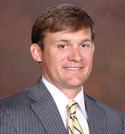
It is encouraging to see legislators taking this issue seriously. However, their efforts will be in vain if Congress ends up rushing this issue through the process by attaching it to a year-end legislative package that includes a short-sighted solution to this national problem.
Congress must solve this problem with the right solution—and so far, there is only one proposal that fits the bill. A process known as Independent Dispute Resolution (IDR) is the surest way to end surprise medical billing without undermining access or affordability for anyone. Unfortunately, the same cannot be said about another purported solution that has been recommended, known as benchmarking.
A benchmarking approach would set artificially and arbitrarily low out-of-network rates for physicians. By essentially giving insurers the power to slash physician reimbursements, a benchmarking-based solution would transfer enormous losses onto local hospitals and emergency rooms, many of which are already contending with their own financial woes—especially in rural communities throughout South Carolina and across the country.
In fact, benchmarking could exacerbate two problems facing rural communities when it comes to health care access: a widespread physician shortage and high rate of provider closure or consolidation. If Congress passes a benchmarking solution to solve surprise medical billing, at-risk hospitals serving our rural communities could face some hard decisions, including laying off much-needed staff, scaling back services, or closing their doors altogether. Any of these outcomes would only further reduce options, undermine access, and raise prices for rural patients who already face such high barriers to care.
That is why I firmly believe Congress must stay focused on passing legislation that includes the far superior, much less disruptive IDR process. IDR would provide a balanced approach in which both insurers and providers would be able to submit their best out-of-network payment offers through a simple, transparent online platform. Within 30 days, an independent mediator would determine a final amount based on these offers as well as a host of third-party data in order to ensure payments are fair and reflect the true cost of providing clinical care in a given location, setting, or facility type.
Moreover, under IDR, health care providers would receive interim, market-based payments that would provide some much-needed financial strength and stability for rural and at-risk hospitals. That would help ensure particularly vulnerable patients living in rural and medically underserved communities would not see their access to care eroded even further. IDR is quite simply the only proposed solution for surprise medical billing that would not have an adverse impact on rural health care.
IDR is also the only approach that has been introduced in Congress with a proven track record of success. In New York, where an IDR-focused law went into effect in 2015, the process has helped lower out-of-network billing rates by 34 percent while emergency care costs have dropped by 9 percent, saving New Yorker $400 million. This approach treats both sides equally, which is why it has the support of New York’s medical community as well as the New York Health Plan Association.
As Congress continues to weigh its options, legislation that has been introduced must be improved to include a meaningful, accessible IDR process if we are going to solve the problem of surprise medical billing in a comprehensive, responsible way. If such a process is not included, Congress should continue debating and working to find a true solution to protect patients from the burden of surprise medical bills once and for all. This issue is simply too important to rush through or get wrong.
When all is said and done, only the IDR process will separate patients from the out-of-network billing disputes between providers and insurers that result in surprise medical bills. That is the solution Congress must work to pass in order to protect vulnerable patients in South Carolina and throughout the nation.
State Rep. Russell Ott, a Democrat from St. Matthews, first was elected in 2013.
- Have a comment? Send to: feedback@statehousereport.com.
Tell us what you think — sound off!
We love hearing from our readers and encourage you to share your opinions. But you’ve got to provide us with contact information so we can verify your letters. Letters to the editor are published weekly. We reserve the right to edit for length and clarity. Comments are limited to 250 words or less. Please include your name and contact information.
- Send your letters or comments to: feedback@statehousereport.com
What’s the story of this house?
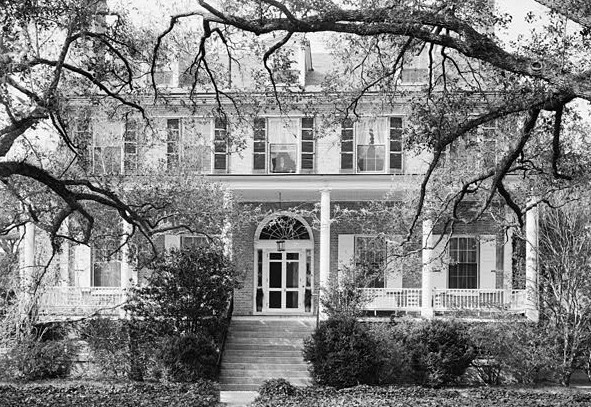
Here’s a grand-looking house. Where is it and, more importantly, why might it be important historically? Send your best guess to feedback@statehousereport.com. And don’t forget to include your name and the town in which you live.
Our previous Mystery Photo
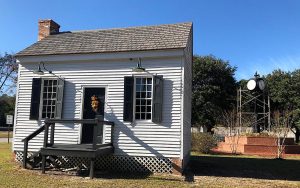 Our Dec. 6 image, “What could this be?” was sent in by Florence reader Barry Wingard. It shows an old library in Society Hill. The Society Hill Library Society got started in 1822 after 12 men paid $20 each to buy books for a library.
Our Dec. 6 image, “What could this be?” was sent in by Florence reader Barry Wingard. It shows an old library in Society Hill. The Society Hill Library Society got started in 1822 after 12 men paid $20 each to buy books for a library.
Few people guessed this week, so hats off to those who identified it: George Graf of Palmyra, Va.; Philip Cromer of Beaufort; and Vic Carpenter of Lugoff.
Graf shared some information according to scpictureproject.org: “This humble building was erected as the Society Hill Library Society around 1826. The society traces its roots to Saint David’s Society, organized in the Pee Dee in 1777. At that time the lands that now make up Chesterfield, Darlington and Marlboro counties comprised Saint David’s Parish. The Saint David’s Society was created by local planters who wished to emphasize education within the parish….
“In 1826 the library was operating on a Main Street property donated by John D. Witherspoon. It was one of the first public libraries in the state, and eventually as many as 2,000 volumes were kept in this small building. At some point the library building was moved to its current site near Town Hall. It was restored in 1971 by the Dogwood Garden Club and the Society Hill Township and subsequently reopened.”
- Send us a mystery: If you have a photo that you believe will stump readers, send it along (but make sure to tell us what it is because it may stump us too!) Send to: feedback@statehousereport.com and mark it as a photo submission. Thanks.
S.C. ENCYCLOPEDIA
White lightning
S.C. Encyclopedia | White lightning, a white whiskey made surreptitiously and illegally, was once produced in great quantities in South Carolina. It got its name from its color and the kick it delivers when consumed.
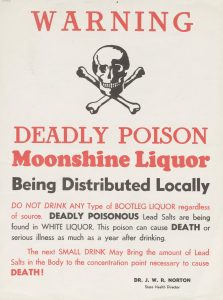 The beverage achieved popularity in South Carolina and the rest of the South largely because of the high taxes on legal whiskey, the ready availability of the major raw material—traditionally corn— and the region’s poverty, which made moonshining an attractive industry for many farmers. Production mushroomed between 1915, when South Carolina went legally dry, and 1933, when national prohibition ended. White lightning became part of the culture of some rural areas, including parts of southern Appalachia.
The beverage achieved popularity in South Carolina and the rest of the South largely because of the high taxes on legal whiskey, the ready availability of the major raw material—traditionally corn— and the region’s poverty, which made moonshining an attractive industry for many farmers. Production mushroomed between 1915, when South Carolina went legally dry, and 1933, when national prohibition ended. White lightning became part of the culture of some rural areas, including parts of southern Appalachia.
The potable, often referred to as “moonshine” because it was usually produced at night, is often made under conditions so primitive that it has proved lethal. But its “proper” manufacture is considered an art form by some backwoods connoisseurs.
The whiskey is produced from mash, which is a mixture of grain, sugar, water, and yeast that ferments to produce the alcohol. Lack of aging leaves the whiskey with a clean “white” look. Distilleries are commonly made of copper for the most part, which, the producers think, helps maintain the flavor. Manufacturers usually make their own stills.
Agents from the Bureau of Alcohol, Tobacco, and Firearms, humorously called “revenooers” by the moonshiners, have sharply curtailed the illegal operations. In 2003 a South Carolina law enforcement official said the last distillery raid had probably occurred just three months earlier. But isolated moonshiners still ply their art in South Carolina, and many of their customers wax ecstatic when they are lucky enough to purchase a batch they consider safe and savory.
— Excerpted from an entry by Robert A. Pierce. This entry may not have been updated since 2006. To read more about this or 2,000 other entries about South Carolina, check out The South Carolina Encyclopedia, published in 2006 by USC Press. (Information used by permission.)
ABOUT STATEHOUSE REPORT
Statehouse Report, founded in 2001 as a weekly legislative forecast that informs readers about what is going to happen in South Carolina politics and policy, is provided to you at no charge every Friday.
Meet our team
- Editor and publisher: Andy Brack, 843.670.3996
- Statehouse correspondent: Lindsay Street
Buy the book
Now you can get a copy of editor and publisher Andy Brack’s We Can Do Better, South Carolina! ($14.99) as a paperback or as a Kindle book ($7.99). . The book of essays offers incisive commentaries by editor and publisher Andy Brack on the American South, the common good, vexing problems for the Palmetto State and interesting South Carolina leaders.
More
-
- Mailing address: Send inquiries by mail to: 1316 Rutledge Ave., Charleston, SC 29403
- Subscriptions are free: Click to subscribe.
- We hope you’ll keep receiving the great news and information from Statehouse Report, but if you need to unsubscribe, go to the bottom of the weekly email issue and follow the instructions.
- © 2019, Statehouse Report, a publication of City Paper Publishing, LLC. All rights reserved.
- Read our sister publications: Charleston City Paper (every Wednesday) | Charleston Currents (every Monday)


